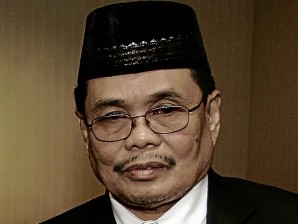
MOHAGHER IQBAL. Using the penname Salah Jubair, Iqbal wrote the books “Bangsamoro: A Nation Under Endless Tyranny,” which traced the history and basis of the Moro struggle for self-determination, and “A Long Road to Peace,” which chronicled the developments in the Mindanao peace process. INQUIRER FILE PHOTO
Mohagher Iqbal is the public face of the Moro Islamic Liberation Front (MILF).
But Iqbal, now in his 60s, is a very private person, talking very little about himself in interviews with journalists.
He does not talk about his family either, keeping the privacy of his relatives through his silence.
Iqbal, who hails from Maguindanao, joined the Moro National Liberation Front (MNLF) in 1972 just after earning a university degree.
The MNLF broke up in 1977, one faction going with Nur Misuari and another, the bigger one, going with Hashim Salamat.
Well-off family
Iqbal joined Salamat’s faction, which became known as the MILF.
He said he did not take up arms against the government for economic reasons, as some people would think.
“If that were so, I would not have become a revolutionary because my family is well-off economically,” Iqbal once told MILF supporters in Lanao del Sur.
Being head of the MILF’s committee on information, Iqbal is called the rebel group’s “think tank.”
But he is known more among his peers in the MILF for his being softhearted, especially toward ordinary people.
In public, however, Iqbal appears as a grizzled, iron-willed warrior.
“Be tough on issues, be soft on people,” Iqbal, who has led the MILF peace panel since 2004, said.
And that, he said, is his guiding principle.
Intellectual influence
Michael Mastura, a member of the MILF panel, said that as a young revolutionary, Iqbal admired the works of Muslim thinkers Muhammad Iqbal and Abul Ala Maududi.
Muhammad Iqbal was a philosopher, poet and politician in British India who worked for the creation of a Muslim state in the northwest part of the subcontinent in the 1930s. Maududi was an early 20th century journalist, theologian, Muslim revivalist leader and political philosopher in British India and later in Pakistan.
The writings of the two men shaped Iqbal’s “ideological outlook,” Mastura said.
Using his nom de guerre Salah Jubair, Iqbal wrote the books “Bangsamoro: A Nation Under Endless Tyranny,” which traced the history and basis of the Moro struggle for self-determination, and “A Long Road to Peace,” which chronicled the developments in the Mindanao peace process.
‘We are man enough’
Being the MILF’s information chief, Iqbal is the Moro rebellion’s spokesperson, a job that became especially difficult after the attacks in Mindanao by MILF renegade groups following the defeat in the Supreme Court of a homeland deal with the Arroyo administration in 2008. He was the only MILF leader who admitted that it was the MILF that broke the ceasefire with the government.
“We are man enough to acknowledge that we started the fighting in Lanao del Norte,” Iqbal said.
“We have violated the ceasefire especially in Lanao del Norte,” he said.
It was that flare-up, which displaced thousands of villagers in Lanao del Norte, that drove the MILF to resolve to work for a negotiated political settlement of the Moro rebellion with the government.
“History has shown that war cannot resolve this conflict. Neither can we defeat the Armed Forces of the Philippines,” Iqbal said.
Reality check
Despite the decision to end the 40-year-old war, Iqbal said his passion for the Moro cause has not diminished a bit.
But reality had caught up with him.
“You learn to check your idealism with reality. You learn to mellow down and let idealism blend with reality,” Iqbal said.
Asked what relations with the rest of the country he wanted the Bangsamoro to have, Iqbal said: “We would never think of getting a divorce [from the Philippine state]. Just live and let live.”